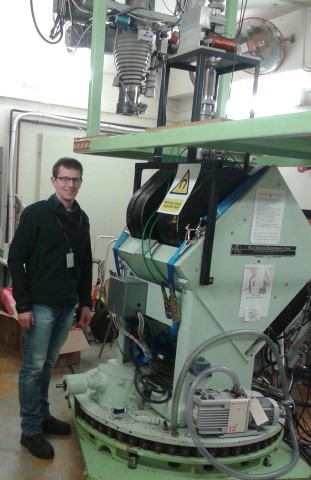John Paul College - Paul Billing

2015 | Life on the thin crust
School: John Paul College
Host: GNS Science
Region: Bay of Plenty
Paul has 13 years of teaching experience and has always been passionate about the use of hands-on activities during his science lessons. During phase one of the programme, Paul learnt how to maximise student learning through careful questioning and class discussions while using practical activities to build towards big science ideas. Paul has also recognizes the value of the New Zealand Curriculum in encouraging wide range of science programmes to enable teachers to reflect the needs of the community and make the most of the local resources.
While placed with GNS Science, Paul spent time working in the Wakarewarewa, Wairaki, Avalon and the National Isotope Centre (NIC) facilities. He became involved in the Rotorua Air Quality Sampling Project, which gave him the opportunity to be involved in the use of air sensors by two Rotorua Iwi. These long term projects offered him an insight into the way scientists purposefully engage with local Iwi in order to tackle problems that require the help of a whole community. Paul was also able to run his own pilot investigation into pollution in the Puarenga Stream, and spent a week in Wellington using the NIC particle accelerator to identify the elements and therefore any potential signs of pollution that were present within the stream water. The results will be provided to the iwi and will help provide guidelines for the children of the Whakarewarewa Village who spend the summer months “penny diving” in the Puarenga stream.
While in the Whakarewarewa facility, Paul also spent time investigating and monitoring the cycle of the world famous Pohutu geyser. His findings have been incorporated into a poster to inform visiting tourists of the science occurring underground to assist them in understanding the phases of the geyser cycle and perhaps predict the next eruption time. Paul also worked to build links between his school and Village by leading the first John Paul College NCEA field trip to Whakarewarewa.
Paul has found the study of leadership theory very beneficial and has already put many of his newly learnt leadership practices to use. He conducted a review of the current Junior Science Program and student engagement involving staff, students and parents. The Science Faculty will use this information to guide decisions about 2016 Science programmes.
During 2016, he has been given a significant leadership role in his school and is looking forward to sharing his newfound knowledge and enthusiasm with both colleagues and students.
